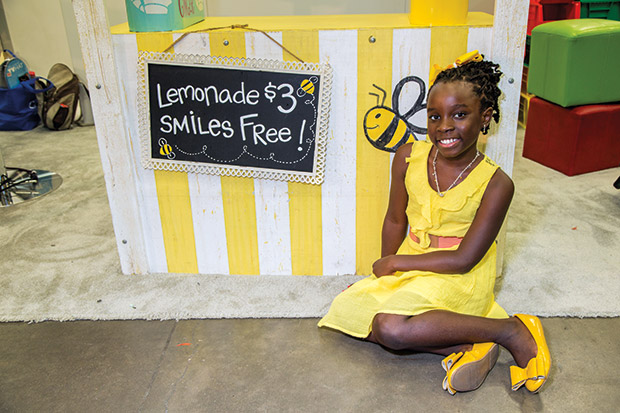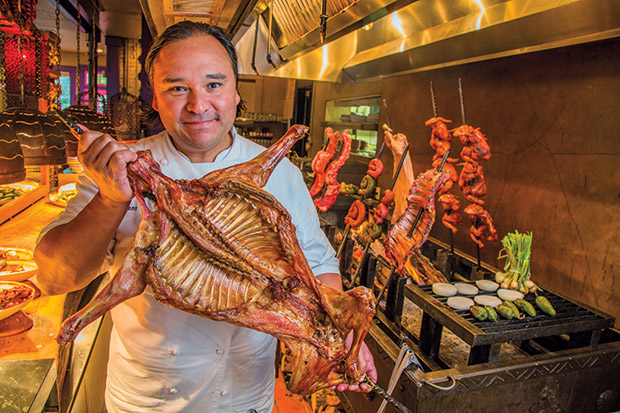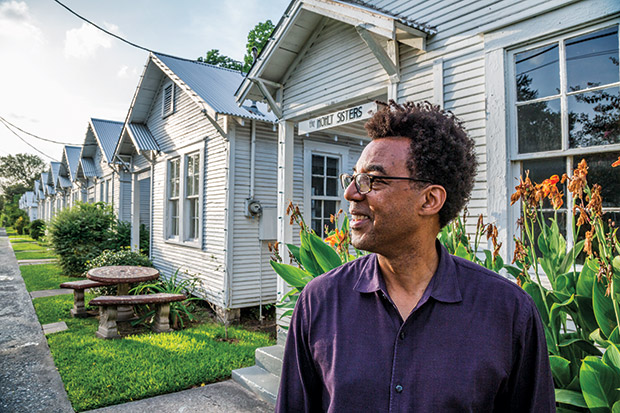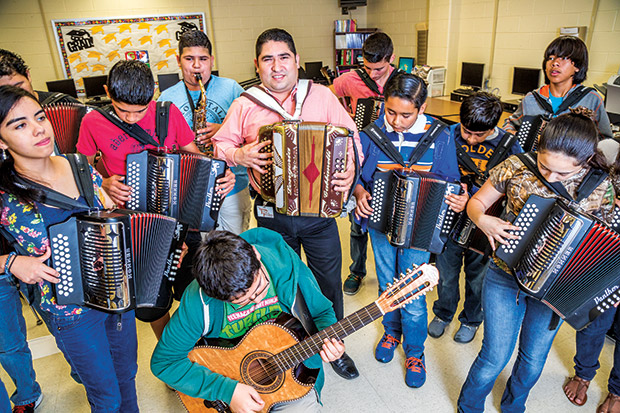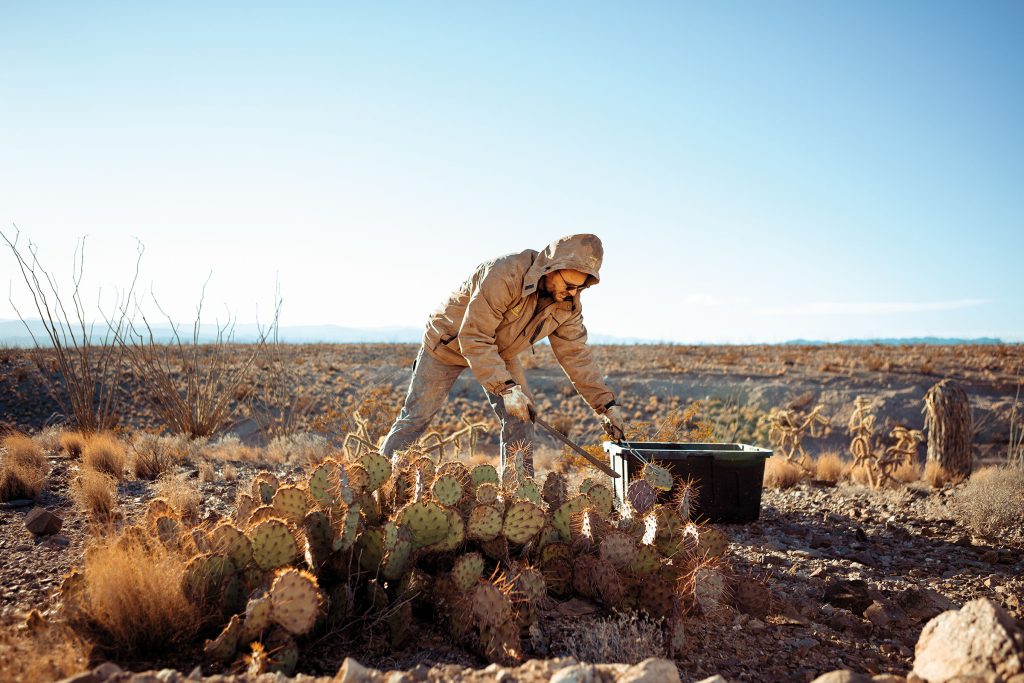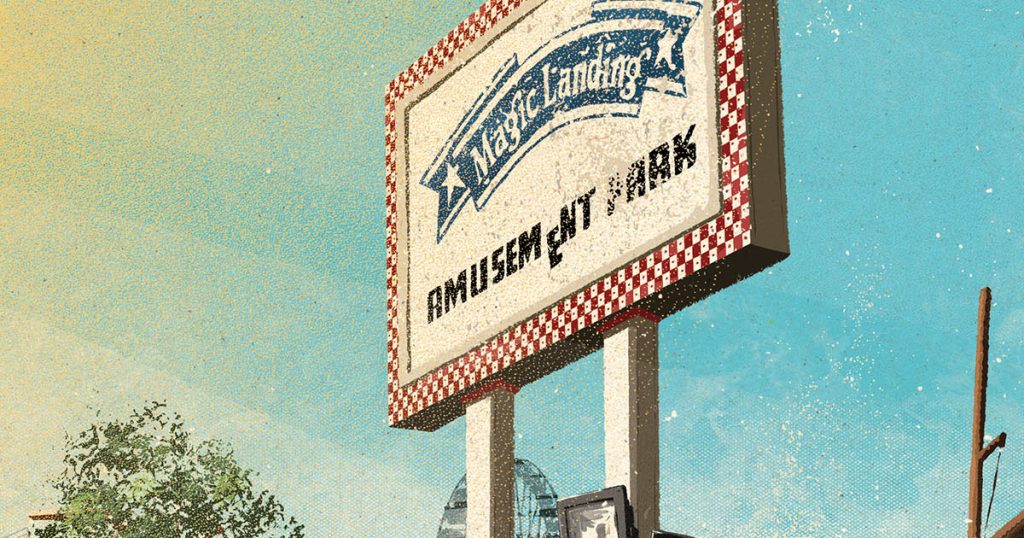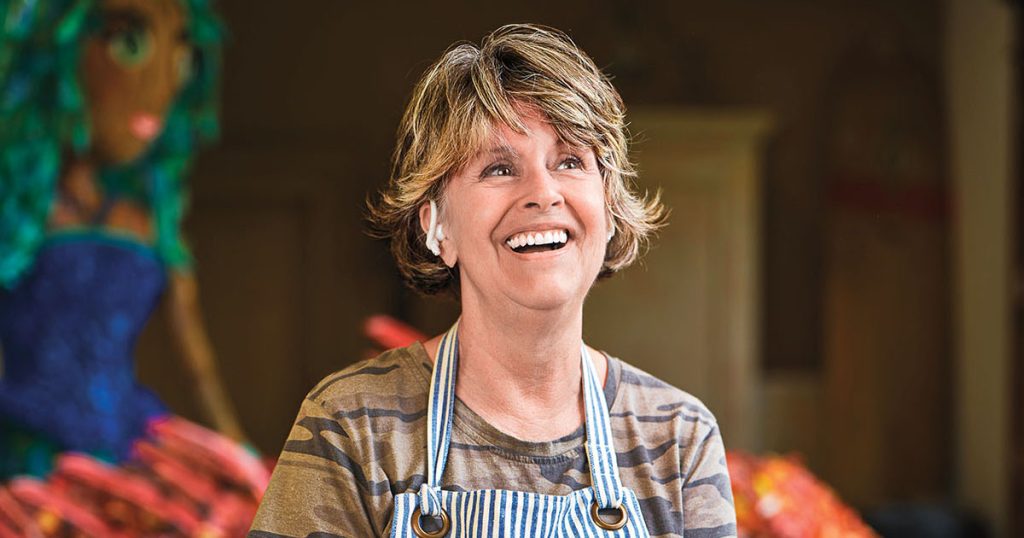This year’s lineup of Extraordinary Texans possesses the brio and gratitude of Texans who love what they do.
More Extraordinary Texans:
Here is a San Antonio restaurateur who inspires aspiring chefs throughout the city and beyond, a 10-year-old Austinite who makes lemonade to help save the honeybee, a Houston artist who is leading the way in art as social practice, and a New Braunfels inventor who pioneers water park technology and sustainability. These and the other hardworking, creative stars featured here keep things shining big and bright, deep in the heart of Texas.
MIKAILA ULMER, BeeSweet Lemonade Owner and Honeybee Advocate
It takes grit and vision to transform a bee sting into a thriving lemonade business, but 10-year-old Mikaila Ulmer of Austin, the owner of BeeSweet Lemonade and a recent guest of the White House, has both by the bucketful. In 2009, after then four-year-old Ulmer was stung twice in one week, her parents encouraged her to learn about honeybees and why they are vital to our ecosystem. As she overcame her fear, she became an advocate for bees and their honey, and soon embarked upon teaching the world about their ecological importance through delicious lemonade.
Ulmer’s spirit of social entrepreneurship was sparked right along with her bee fascination. Motivated by the Acton Children’s Business Fair, an annual marketplace for young entrepreneurs based in Austin, and inspired by the nationwide Lemonade Day in May, Ulmer found her Great Granny Helen’s flaxseed lemonade recipe in a cookbook from the 1940s, added mint from her garden and local honey, and her first batch of BeeSweet Lemonade was born. “These experiences taught me how to handle ingredients, how to take on loans, and how to understand profit margins,“ she says with confidence.
Ulmer’s pluck so impressed entrepreneur and “Shark Tank” reality-show personality Daymond John that earlier this year, he invested $60,000 in the business to help it grow nationally. Already, more than 32 southern Whole Foods stores stock her lemonade, and thanks to the recognition from “Shark Tank,” she hopes to soon make BeeSweet available in schools, hotels, and airports.
Of her “Shark Tank” recognition, Ulmer notes, “I was kind of stunned I won the award, but I was also very proud knowing that I had worked really hard and that he believed in me. I am so excited to see what comes next.”
Toni Tipton-Martin, Food Activist and Author
By illuminating the past, food activist and author Toni Tipton-Martin is reframing the future. In her new book, The Jemima Code: Two Centuries of African American Cookbooks (the University of Texas Press), Tipton-Martin gives voice to the African Amer-icans who worked in kitchens throughout the United States, revealing the wisdom, artistry, and values that characterize their role in culinary history. Using her rare antique cookbook collection as source material, along with modern classics by Edna Lewis and Vertamae Grosvenor, she highlights how African Americans have long occupied a creative place in the kitchen.
“People these days are speaking about the dearth of opportunities for young people in the urban cores,” says Tipton-Martin. “By showing them that they have a strong and vibrant food industry history, one that helped their ancestors move into the middle class, I hope that some young people might consider careers with food.”
Tipton-Martin, who has been a repeat guest at the White House to share her work, believes in the power of positive food culture so much that she began a foundation called The SANDE Youth Project to combat childhood hunger and obesity by promoting the connection between cultural heritage, cooking, and wellness. Through the SANDE Foundation, Tipton-Martin has hosted the Peace Through Pie initiative, an MLK Day pie and culture sharing event, and in June, she organized the first annual Soul Summit in Austin, an unprecedented gathering of scholars, chefs, authors, and activists who explored issues of race, identity, power, and food.
“There is no simple solution,” says Tipton-Martin, “but if you look at history and really think about it, you come to a place where you realize there is room for everyone at the table. The work is meant to bring us together.”
Jeff Henry, Inventor and Schlitterbahn Water Parks Founder
Jeff Henry is the inventor and entrepreneur behind Schlitterbahn Water Parks, which today has four locations in Texas and one in Kansas City, Kansas. This adventuresome, affable, and tireless visionary for attractions like lazy rivers for tubers and land-based water surfing has 60 patents to his name and is always the first man to take the plunge on Schlitterbahn’s new rides. How else can he figure out how to make things better? And Henry is committed to making things better—as well as faster, taller, and a whole lot more fun.
That’s why he is pioneering new ways to repurpose such unlikely candidates as railroad tankers, bridges, oil rigs, and other structures for new lives in Texas water parks. In fact, much of what you see in his parks used to serve other purposes. Henry used timber discarded from the 2011 Bastrop fires to build decking, furniture, and siding at his parks in New Braunfels, South Padre Island, and Corpus Christi. Right now, using salvage from an old shipyard and oil rigs, Henry is constructing a transportable ocean-based ride that will move among his Texas coastal sites; it will be the tallest in any park in the world, wet or dry. “Using old oil rigs and tankers means I get a source of structural material at a low price, and then I get to build even bigger and cooler things,” say Henry, with the excitement of a boy at play.
And when there are problems, Henry and his team find the solutions. “I am like MacGyver in a lot of ways. I work with 50 guys who have been with me for about 30 years and they are all incredibly competent. We are right on the borderline of being insane—we’ll do some crazy stuff—but we are very calculated about what we do.” Crazy stuff has led to some crazy success for America’s first family of water resorts.
And it is clear that this man, who built his first tree house from repurposed redwood when he was seven and hasn’t stopped building since, loves what he does. “It’s a lifestyle, not really a job,” he says.
Johnny Hernandez, Chef and “Godfather of Mexican Food,” San Antonio
Not only is San Antonio chef Johnny Hernandez putting San Antonio on the national food radar, he is also changing the way people think of Mexican cuisine. With his first restaurant, La Gloria, which opened in the Pearl Brewery redevelopment in 2010, he introduced the street food of interior Mexico, a territory he maps like a food anthropologist. Now he has a growing empire that includes a botanero called La Frutería, the meat-centric El Machito, and the upscale Casa Hernán event space.
Chef Johnny continues to push taste bud frontiers at the expansive new La Gloria that will soon open on San Antonio’s north side. Here, diners can try out his cacao and tequila tasting program, as well as enjoy tortillas and chips made from corn grown by the Mexican and Guatemalan farmers Hernandez has befriended during his many research trips. “There is nobody doing it the way we are doing it,” says Hernandez. “Bringing in the native corn and cacao gives us another rich story to share with people about what Mexican food is and where it comes from.”
And what really makes Hernandez the “godfather of Mexican food” in San Antonio—as he was dubbed this summer by television food personality Andrew Zimmern—is his dedication to food education. As the founder of San Antonio’s popular Paella Challenge and a supporter of the Culinary Institute of America at the former Pearl Brewery, Hernandez is helping teach and provide scholarships for the future chefs of the region. His titanic grill at El Machito—said to be the biggest in town at nine feet—serves as a practical training zone in open flame and live fire cooking for students at the CIA’s San Antonio campus. “I love to learn and explore and then share this amazing food culture. I want our customers and culinary students to learn about and experience bits of history or unique things that they’ve never seen before.”
Chef Johnny is bringing plenty of the never-been-seen-before our way—and it tastes delicious.
Rick Lowe, Artist, Project Row Houses, Houston
Never underestimate the power of art to transform a community. Especially when in the hands of artist and social architect Rick Lowe, founder of Houston’s Project Row Houses.
In the early 1990s, a question from a high school student inspired Lowe to use his creativity to find real solutions to problems facing his community. With the help of fellow artists, Lowe organized the purchase and renovation of 22 charming but derelict 1930s row houses slated for demolition in Houston’s predominately African-American Third Ward. Working closely with the neighbors, Lowe has since transformed the Project Row Houses into a thriving cluster of gallery spaces and sites for established and emerging artists’ residencies. There’s also a residential mentorship program for young mothers, an organic gardening program, and a neighborhood think-tank for low-income housing design.
At the forefront of a paradigm known in the art world as “social practice,” Lowe’s work is widely recognized for challenging the concept of what art can do, so much so that the Chicago-based MacArthur Foundation awarded him with a “genius” grant last year to help him realize his ideas.
Lowe, who lives near the Project Row Houses, recognizes that this kind of social art is never finished and always changing. On any given day of the year, the PRH is abuzz with kinetic energy; artists and residents are preparing for shows, sharing ideas, and making plans. And Lowe is there in the thick of it, shaking hands and waving to neighbors.
“The PRH is a neighborhood where most of our residents, staff, volunteers, and visitors share a heightened awareness of our cultural community,” Lowe says. “We have an open-door policy where residents and visitors alike are welcome to come and share their thoughts. We value that as a way of maintaining an open and engaging atmosphere. That’s how we keep a pulse on what’s going on in the neighborhood and what we should be addressing.”
Roland Swenson, Co-Founder of South by Southwest Festival, Austin
The words “South by Southwest” now trip readily from the tongues of music, film, and technology enthusiasts across the planet. The mammoth, multilayered festival that brings hundreds of thousands of people to Austin each March makes dreams come true: Bands are discovered, trends are uncovered, new stars are made. So it’s hard to believe that this revered whopper of all festivals kicked off as a homespun music event by Austin Chronicle staffer Roland Swenson and his colleagues back in 1987.
“I always believed that SXSW could be a large and influential event, which is why we worked so hard to get it off the ground,” says Swenson. “However, when we started SXSW, we couldn’t really imagine how much the world would change. It’s hard for us to have a perspective on SXSW’s place in the world because we are so close to it. But I frequently have ‘Wow, how did we do that?’ moments.”
This native Austinite and former UT student attributes much of the festival’s success to Austin’s amazing growth as a creative community and also to his dedicated co-workers. “The best part of my job is working with the people here who are so passionate about SXSW and the work we do,” Swenson says.
Swenson has overseen SXSW’s expansion from a festival of about 700 registrants to a film, technology, and music conference of more than 84,000 official registrants and countless unofficial participants in 2015; it has become Austin’s top grossing event of all time. Swenson is excited to see further cross-pollination of genres as the festival moves forward.
And, despite all the work, Swenson still has fun. “This year, I saw a great show by one of my favorite bands, Spoon, who played a free outdoor show on Auditorium Shores on Lady Bird Lake, which included a fireworks show, and I also saw a wonderful act from Pakistan, led by 80-year-old female singer Mai Dhai.” A lifelong Austinite, Swenson still enjoys what SXSW has offered faithfully for almost 30 years: music so good you’ll be talking about it long after the show is over.
Juan Longoria, Los Fresnos High School Conjunto Program Founder
Through music, Juan Longoria Jr. is changing high school kids’ lives along the Texas/Mexico border. As the founder of the Los Fresnos High School Conjunto program, this award-winning accordion player is motivating students to work hard, stay in school, and strive for their dreams, simply by teaching them to play the music that is an integral part of their cross-cultural identity.
Longoria, who learned to play the accordion from his father and has now passed it on to his own son, says that conjunto music is deeply rooted in both who he is and life along the border. “Since my first talent show in elementary school, this music has followed me. Whenever folks are getting together, it’s always, ‘Hey, Longoria, bring your accordion.’ It’s part of the culture here.”
When Longoria, who also plays in the popular conjunto band Conteño, pitched the idea for a conjunto program to the administration of Los Fresnos High School in 2011, Principal Ronnie Rodriguez loved the idea and got on board to make it happen. “Now,” says Longoria, “teachers from other schools tell me, ‘I wish we would have had a program like this.’”
With a business degree from the University of Texas at Brownsville, Longoria believes in the power of education; his greatest satisfaction is helping his students succeed, especially those who are at risk of dropping out. “I’ve seen a lot of students who were failing, but they’ve improved their attendance and grades so that they could be in the program. And some have become so motivated because they are able to graduate, that now they want to go on to college, too.”
Longoria’s 14-year-old son, who is now winning his own awards for the accordion, will be a student in the program this year. Longoria wants to teach him and all of his students to take the music seriously. “This is an art form. If you are going to sing, sing with passion. If you are going to play, play with passion. You have to feel it; you have to put your heart into what you are doing, or why bother?”
